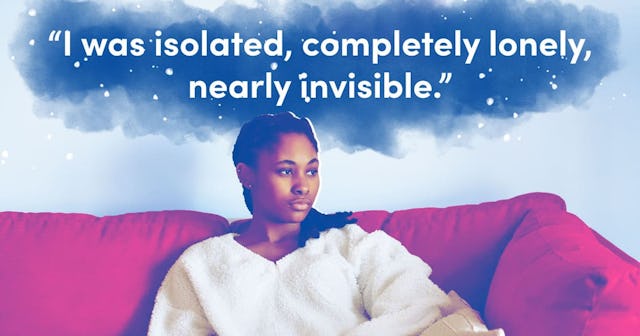It Took A Freaking Pandemic For My Husband To Understand The Isolation I Feel As A SAHM

It wasn’t just my PPD speaking, though it certainly contributed to how awful I felt: I was isolated, completely lonely, nearly invisible.
Of course, any new stay-at-home-mom with mental health concerns would say that, but where was the evidence? Could it be verified? And didn’t literally every other person exist like this? After all, they only go to work, talk to their coworkers, sit in an office all day. They don’t have intimate friendships, in-depth philosophical conversations, or discuss their grief and joys, right? This was especially so for men, folks who have barely any social support, who often go back to the office while their female counterparts typically stay home (if someone is staying home).
So, back in 2016, anything I could say my situation wasn’t all that unique. I could, and often did, go weeks without speaking to another person. I could, and did, go days and weeks without seeing another person. I could barely leave my house given my nursing, napping every two hours, pumping, cleaning—life—schedule.
So what?
“I only go to work, I don’t talk to anyone about my life, I’m lonely. Going to work is not social interaction,” said my husband.
“You don’t need to be friends with people to interact with them. They use their actual voice to actually speak to you,” I replied. “They even look at you while you’re doing it.”
“This is not some luxury, this is not me having the life you don’t have. We’re all lonely, we’re all alone.”
Yes, you’re lonely, you’re alone, but you’re not isolated. You don’t exist in near-complete isolation, like me. There’s a difference.
Fast forward to 2019, I’m now a stay at home mother of two — with far less profound mental health concerns than in 2016, but still mostly isolated. I can’t really see friends, I can’t get out of my house, I barely speak to people: it seems to be a pattern when you have an infant, and is compounded by having a toddler. All that was nothing new until a few months ago, when I was literally isolated in the very same way, except this isolation was by order of the governor. And this time it wasn’t just me; it was everyone around me.
My husband, who chucked up his deuces and exited the house leaving me milk-stained, hysterical, and all alone with my postpartum depression in 2016 with our seven-week-old newborn, was now among the folks being told to stay home by their workplace.
And it was all just fine. He spent more time with our kids! He spent more time with me! He could just do work for the four hours he needed to and just stop working instead of dicking around on Reddit for the remaining four hours! It was all-caps AMAZING. For weeks, it was amazing.
Freestocks.org
Until it wasn’t. Until today. Until he told me something so familiar that, for a split second, it broke my heart. He told me that he enjoyed working from home, that he wants to do it permanently, but that it was hard. When asked why, he said the words I once heard coming from my own mouth.
He said he feels isolated. He said he missed social interaction, he misses seeing his coworkers, he misses talking to them. He said that he just misses being near people, having those little interactions that are all a part of being human. People laugh at your jokes, shake your hand, look you in the eye. You hear their voices, see their faces, and you’re really there, with them.
And he said that — for the first time — he understood what I meant when I first described my situation back in 2016.
I cried a little and then, basically instinctively and totally unintentionally, practically yelled, “Exactly, dude. This is what I’ve been saying for the past four years!”
Self-isolation became a thing for most people just a few months ago. Self-isolation became a reality for so many other folks years, decades, centuries ago.
You don’t need to be in quarantine to be isolated. You don’t need to have capitalism, a gaggle of random men, or boomers of any kind validate the real experiences you’ve had before this all began. If you felt like you were doing all of this before, just without all the Clorox, then I’m here to say that I know. I see you. I see how this adds another layer on top of what you’ve already been going through. I know it’s not easy.
I know what some people will say: that what you’re experiencing as a stay-at-home-parent is not isolation, that everyone—not just parents—lacks connection, that this is a part of the job. And while I make allowance for the little realities in those sentiments, I hold space for all of the ways in which they are short-sighted and not true.
It has been this way for me for four years: four walls, nothing else, no one else.
And now, finally, my husband understands.
This article was originally published on